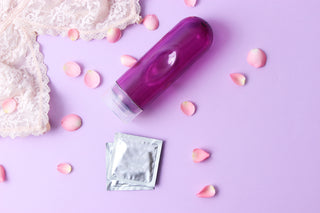Lubricant can make sex more enjoyable and help prevent infection, but you should be aware that lube expires. So, before reaching for the lube bottle that has been hiding in your bedside cabinet forever, it's worth knowing the facts before you spoil the moment.
In this blog, we'll discuss the shelf-life of lube, the potential risks of expired lubrication, and tips on determining when your lube has gone off and what to do with it if it has expired.
Table of Contents:
- What Is Lube?
- What Ingredients Makes Up Lube?
- Does Lube Expire?
- How Does Lube Stop Infection?
- How Long Does Lube Last?
- What Can You Use If A Silicon Or Water-Based Lube Is Not Available?
What Is Lube?
Lubricants, in the general sense of the term, are substances used to reduce friction between two surfaces in contact with each other. In some cases, it is necessary to ensure components move freely without causing any damage to either surface.
Lube is the slang name for lubricant, but basically, they are the same thing; other names for lube are grease or oil, but lube is the most commonly used name for lubricant on social media, notably Snapchat, Instagram, and TikTok.
What Ingredients Makes Up Lube?
Three kinds of personal lubricant for sexual use; these are water-based, silicon-based, or oil-based lube.
The most commercially used lubricants are either water-based or silicon-based products. These products are less likely to cause irritation and infection.
The most common lubricant in condoms is polydimethylsiloxane or silicon fluid, whereas the make up of water-based lubes is different. Water-based lubricants often include a preservative such as sorbates and benzoic acid (parabens) and an antimicrobial such as methylparaben.
Oil-based lubricants are less popular and better for external use, such as massage oil, and experts do not recommend them for latex condoms.
Does Lube Expire?

Yes — just like food and medications, lube does expire. Although it does not go bad in the same way food does – becoming mouldy or rancid - it does lose its effectiveness over time.
When lube expires, the product's preservatives break down, and the oil begins to separate from its water base, making it no longer effective as a lubricant.
How Do You Tell If Your Lubricant Has Expired?
Several signs indicate your lube has expired:
- Change in colour or smell – If you notice any discolouration or changes in how your lubricant smells, it has likely gone bad, and you should replace it.
- Change in consistency – If your lube does not seem to flow as easily as before, the viscosity has been compromised, and it may no longer be effective.
- Signs of separation – You typically see this with oil-based lubricants, where you might notice that the oil and water have separated, creating an oily layer on top.
- Crystallisation - if crystals appear in the bottom of the liquid container, it's best to throw the product away.
It's important to discard expired lubes as they can cause skin irritation or other issues if used after expiration. Additionally, expired lube will provide less protection against bacteria and fungi than a fresh product.
How Does Lube Stop Infection?
You can use lubricants to help prevent the spread of sexually transmitted diseases (STDs) by reducing friction and allowing for smoother penetration during sexual intercourse.
Additionally, a quality lubricant can help couples maintain adequate hydration levels, which is essential to avoiding any discomfort or tearing that could lead to infection. And some water-based lubricants contain antimicrobials which are antibacterial and antifungal.
How Long Does Lube Last?
The shelf life of lubricants will vary depending on the type and brand in question. Generally speaking, most lubes can last up to three years if stored properly. Water-based lubes tend to have a shorter lifespan than oil- or silicone-based ones due to their higher water content which can cause them to spoil more quickly.
For the best advice, always refer to the packaging for specific information about shelf life and storage instructions.
Is Expired Lube Bad For You?
Yes, expired lubricants can be harmful to you. As mentioned above, expired lubricants may contain bacteria which can lead to irritation, rashes, or even infections. In addition, expired lubricants can cause damage to surfaces and components due to reduced viscosity and decreased effectiveness.
For these reasons, it is vital to check the expiration date on lubricants before use and discard any lube that has been open and exposed to the environment for more than one year.
What Can You Use If A Silicon Or Water-Based Lube Is Not Available?
Other options are available if you cannot access silicon or water-based lubricant. Oil-based lubes can be substituted if needed; you can use natural oils such as coconut or almond oil as lubricants.
However, these should not be used with latex condoms as they may cause them to break down or tear. Additionally, it's important to remember that any oil-based products must be washed off thoroughly after use for safety reasons, unless otherwise stated on the packaging.
Vegetable or olive oil is not recommended for internal use; these oils can irritate and should only be used externally (for massage) or for anal sex if other specifically designed lubricants are unavailable.
Overall, it's important to understand that lubricants are essential to safe sex and proper hygiene; knowing how to use them correctly can enhance your pleasure and keep you safe.





